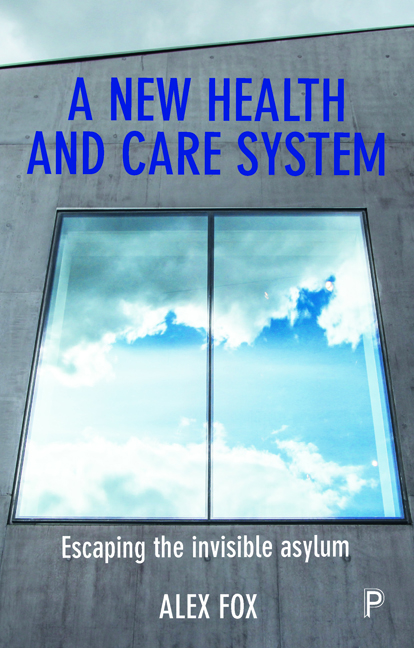Book contents
- Frontmatter
- Dedication
- Contents
- Acknowledgements
- Prologue
- Introduction
- one How we divide the world into community and asylum
- two How we create problems by trying to fix them
- three Why failure pays, but success costs
- four Risk aversion and risk indifference
- five The humanisation experiment
- six Shared Lives
- seven Designing a new national health and wellbeing service
- eight Delivering the national health and wellbeing service
- Can we escape?
- Notes
- References
- Index
one - How we divide the world into community and asylum
Published online by Cambridge University Press: 08 April 2022
- Frontmatter
- Dedication
- Contents
- Acknowledgements
- Prologue
- Introduction
- one How we divide the world into community and asylum
- two How we create problems by trying to fix them
- three Why failure pays, but success costs
- four Risk aversion and risk indifference
- five The humanisation experiment
- six Shared Lives
- seven Designing a new national health and wellbeing service
- eight Delivering the national health and wellbeing service
- Can we escape?
- Notes
- References
- Index
Summary
When disability happens in your family it is like you wake up in a place you never knew existed, a place that many families refer to as ‘service land’, where things are often done to you rather than with you. The search for an accurate diagnosis takes over your life, ultimately knowing that if you have a name for what is wrong, this will give you the passport to the support and services that you need. We have created a system which has put people in competition with each other, because our social care system is neither equitable nor transparent, we have made people dependent on the system, by reinforcing that ‘the state knows best’, yet we have the biggest population across the western world of people with disabilities or support needs who are likely to outlive their family members, this has never happened on such a huge scale before. We have over complicated the lives of people with learning disabilities and their families and need to bring people back to ordinary lives, not just the chosen few living extraordinary lives.
(Caroline Tomlinson, activist, parent and founder of My Life)In the days of workhouses, asylums, debtors’ prisons and fever hospitals, it was easy to see who was considered part of their community and who had been removed from the community, for support, punishment or a combination of the two. Most of the most obviously institutional buildings have gone, but the ideas behind that divide between those inside and those outside the community remain invisibly woven into our public services which provide long-term support.
Maintaining that divide can feel comforting, particularly during times in our lives when we do not find ourselves needing state-organised or funded support. Most of us prefer to feel that there is little possibility of state involvement in our lives. People who require long-term support are doubly stigmatised: once through being labelled with the names of stigmatised conditions such as mental ill health, and again, through being seen as having lost capacity, independence, full citizenship. The popular perception of many kinds of support service remains rooted in folk memories of people in uniforms that came to ‘take you away’ and forbidding Victorian buildings. Ignoring state services is, however, a luxury which few of us can afford to maintain throughout our ever-lengthening lives.
- Type
- Chapter
- Information
- A New Health and Care SystemEscaping the Invisible Asylum, pp. 13 - 32Publisher: Bristol University PressPrint publication year: 2018



